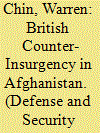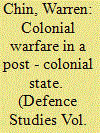| Srl | Item |
| 1 |
ID:
078709


|
|
|
| 2 |
ID:
104151


|
|
|
| 3 |
ID:
096516


|
|
|
| 4 |
ID:
077135


|
|
|
|
|
| Publication |
2007.
|
| Summary/Abstract |
This paper examines how and why the American military helped create and exacerbate the current insurgency in Iraq and the actions it has taken since summer 2004 to address perceived operational and tactical errors. Of key importance in this process of reform were the influence of the British and their articulation of a plan which has exerted a strong influence on subsequent political and military operations within Iraq. Whilst the paper generally supports the counterinsurgency plan that is currently being implemented it identifies a series of challenges that could cause this strategic solution to unravel.
|
|
|
|
|
|
|
|
|
|
|
|
|
|
|
|
| 5 |
ID:
167121


|
|
|
|
|
| Summary/Abstract |
War made the state, and the state made war, but does this statement hold true today? Will it apply in the future? The consensus is that the absence of major war within the western world, post 1945, did cause the war–state relationship to change, but each became significantly less important to the other. This article argues that the relationship was closer and deeper than has been assumed. It proposes that the peculiar strategic conditions created by the nuclear age caused states to wage a ritualistic style of war, in which demonstration rather than the physical application of violence became increasingly important. Within this setting, the state drove the process of technological innovation in defence to its limits in an effort to demonstrate its military superiority. This massive peacetime investment in defence technology exerted a huge impact on the character of war, which led to new strategic forms. However, most importantly, the diffusion of military technology also affected the wider economy and society, leading to a form of internal power transition within states. The author speculates on how these elemental forces will play out in the future, what will happen to war and the state, and whether we will reach a point where war leads to the unmaking of the state.
|
|
|
|
|
|
|
|
|
|
|
|
|
|
|
|
| 6 |
ID:
087333


|
|
|
|
|
| Publication |
2009.
|
| Summary/Abstract |
The purpose of this article is to explain why the UK's strategy and operations in the war on terror have so far failed to produce the desired strategic effect. Britain's counterterror strategy has been plagued by a five basic challenges: the nature of the enemy and the emergence new terrorism; the inability of the UK to articulate a coordinated counterterrorist/counterinsurgency strategy; the particular goals adopted to fight this war; and the resource challenges created by these operational and strategic objectives. The central argument is that British national and military strategy is fundamentally flawed because the UK has failed to pay sufficient attention to the basic preconditions required to generate a successful strategy. Because of this failure at the highest political level, the armed forces have faced the challenge of trying to reconcile a profound mismatch between resources and commitments.
|
|
|
|
|
|
|
|
|
|
|
|
|
|
|
|